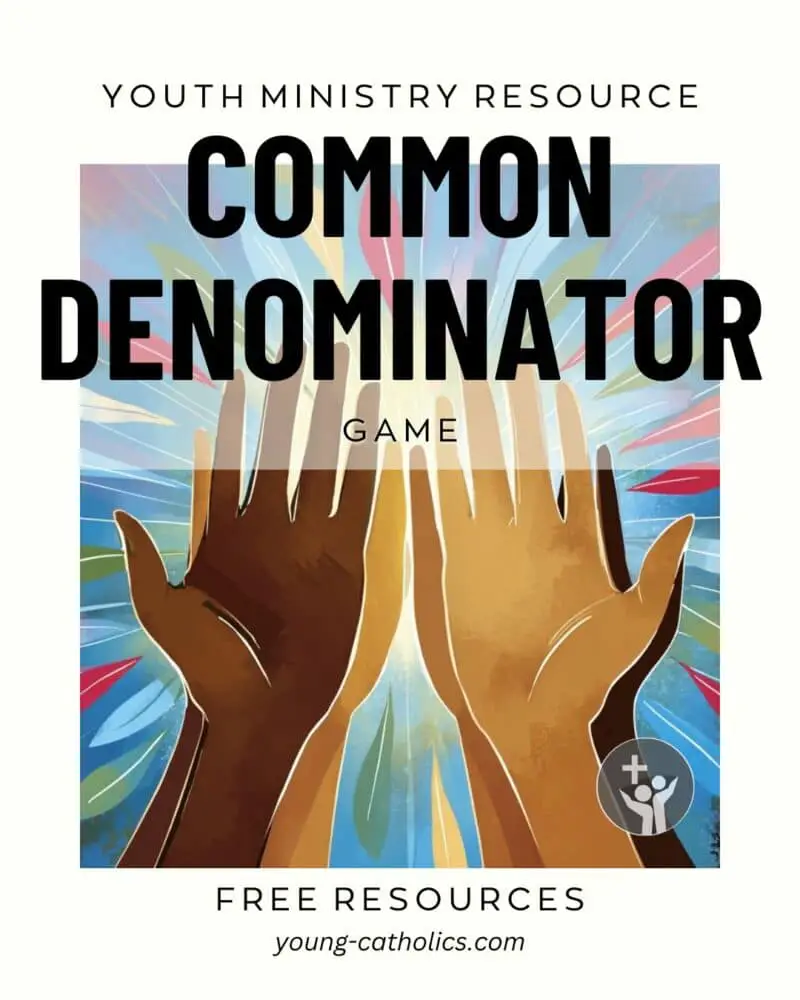Common Denominator Icebreaker

Getting to know others can feel awkward at first. Many young people want to make friends but don’t know where to start. The Common Denominator Game helps break the ice. It gives everyone a fun reason to talk, laugh, and share. It makes the room feel more friendly and open.
This game helps youth learn how much they have in common with others. They start to notice things they might not see right away. Maybe someone else loves the same snack. Maybe they both have the same number of siblings. These little connections can build new friendships.
The game also helps kids grow in teamwork. Each round gives them a small challenge to solve together. They have to talk, think fast, and agree on something. This helps them learn how to listen and include everyone. It also builds trust as they try to win points together.
Finally, the Common Denominator Game brings joy. It’s full of energy and surprises. It gets everyone moving and laughing. At the same time, it helps create a space where youth feel safe, seen, and welcome. That kind of space is a great start for any group, class, or ministry.
Twelve Sandals and a Pair of Crocs
The Common Denominator Game fits well with many Bible stories. In the Gospels, Jesus often noticed simple things people had in common. He talked to fishermen, tax collectors, and even children. He met people right where they were. In this game, youth learn to do the same. They start by finding something small and true they all share.
This game also connects to the story of the woman at the well. Jesus spoke with her even though others avoided her. He saw her as a person, not just her background. When youth look for something in common, they practice seeing others with kindness. They stop focusing on who is popular or who is different.
St. Paul wrote that we are all part of the Body of Christ. We each have a place. This game reminds youth that everyone has something to share. Even if someone feels shy or quiet, they belong. Finding common ground helps them feel that truth in a simple and fun way.
In youth ministry, this game creates small moments of discovery. It helps young people notice what matters most—who they are, what they value, and how God works in others. And sometimes, it all starts with realizing that five kids in the room really like waffles.
Common Denominator Icebreaker Instructions
Equipment / Materials Needed
None
This game needs no materials. Just a group of players and a space where everyone can move safely.
Setup Instructions
- Choose a leader to run the game.
- Gather all players in one open area.
- Make sure everyone can hear the leader.
- Remind players they will be moving and talking in small groups.
Game Play Instructions
- The leader explains the goal: to form small groups and find something everyone in the group has in common.
- The leader calls out a number between 3 and 6. That is the size of group players must form.
- Players quickly move and form groups of the correct size.
- Each group has 15 seconds to find one thing they all have in common. It must be clear and true. Examples: “We all have glasses” or “We all like pizza.”
- When the 15 seconds are up, there is no more talking. Groups must stay silent until it’s time to share.
- One at a time, each group shares its common trait.
- To earn a point, a group must:
- Have the correct number of people
- Stay silent after time is up
- Share a common trait that is not repeated by other groups
- Choose a clear and real commonality
- Have every group member agree and fit the commonality
- Play several rounds with the leader calling out different group sizes.
- To keep things fun, the leader can sometimes call a silly number, like 7 or 4½.
- At the end, the player or team with the most points wins.
Extra Tips and Variations
- For large groups, add a rule that players can’t be in a group with someone they were with in the last round.
- To add a challenge, set the timer for only 10 seconds.
- For fun, let the group with the most creative commonality win a bonus point.
- Always make sure the space is safe to move around. No running or pushing.
- This game works best when everyone plays with kindness and includes others.
Resources

More Youth Ministry Games
The Common Denominator Icebreaker game is a fun way to help youth connect and share laughs. It gets everyone moving, talking, and learning little things about each other. It’s a great fit for youth nights, retreats, or classroom fun.
Want more ideas like this? Visit our youth ministry games page. You’ll find many other games that help build joy, trust, and friendship. Try a few and see which ones your group enjoys most.
Questions and Answers about the Common Denominator Icebreaker Game
What is the Common Denominator Icebreaker game?
It is a fun group activity where players form small groups and find something they all have in common. The game helps people learn about each other.
How many people can play the Common Denominator Icebreaker game?
You can play with any group size, but it works best with at least 10 people. Bigger groups make it more exciting.
Do I need any supplies to play the Common Denominator Icebreaker game?
No. You don’t need any materials or equipment. Just a group of people and space to move around.
How long does the Common Denominator Icebreaker game take?
Each round takes just a few minutes. You can play for 10 minutes or keep going as long as the group enjoys it.
What kind of commonalities work in the Common Denominator Icebreaker game?
They must be simple, clear, and real. For example, “We all like ice cream” or “We all have brown hair.”
Can I be in the same group twice in the Common Denominator Icebreaker game?
For a challenge, try not to repeat groups. This helps people mix and learn about more friends.
Not Just Socks and Siblings
The Common Denominator Icebreaker game may sound simple, but it brings out big smiles and real moments. Each round opens a new door. It helps youth discover fun facts and shared likes. It also helps them notice things they never knew they had in common.
Laughter often fills the room during this game. There is joy in the quick movement, silly discoveries, and creative answers. It creates energy that helps everyone feel welcome and involved.
Even shy teens find a place in this game. The small group setting gives them a chance to speak up and be heard. Over time, it helps the group feel like a family—connected and aware of each other.
This game can also open hearts to deeper lessons. It helps youth reflect on who they are and how they relate to others. It prepares the way for real friendships and stronger faith sharing later on.
Your Turn
Give the Common Denominator Icebreaker game a try with your group. Whether you have ten kids or fifty, it can bring fun and connection in just a few minutes. It works well at the start of a retreat, a youth night, or even during a break in class.
After you try it, come back and let us know what worked best. Did your group come up with any funny or creative commonalities? Share your tips and ideas in the comments to help others make this game a success too.



Leave a Reply